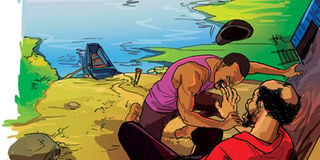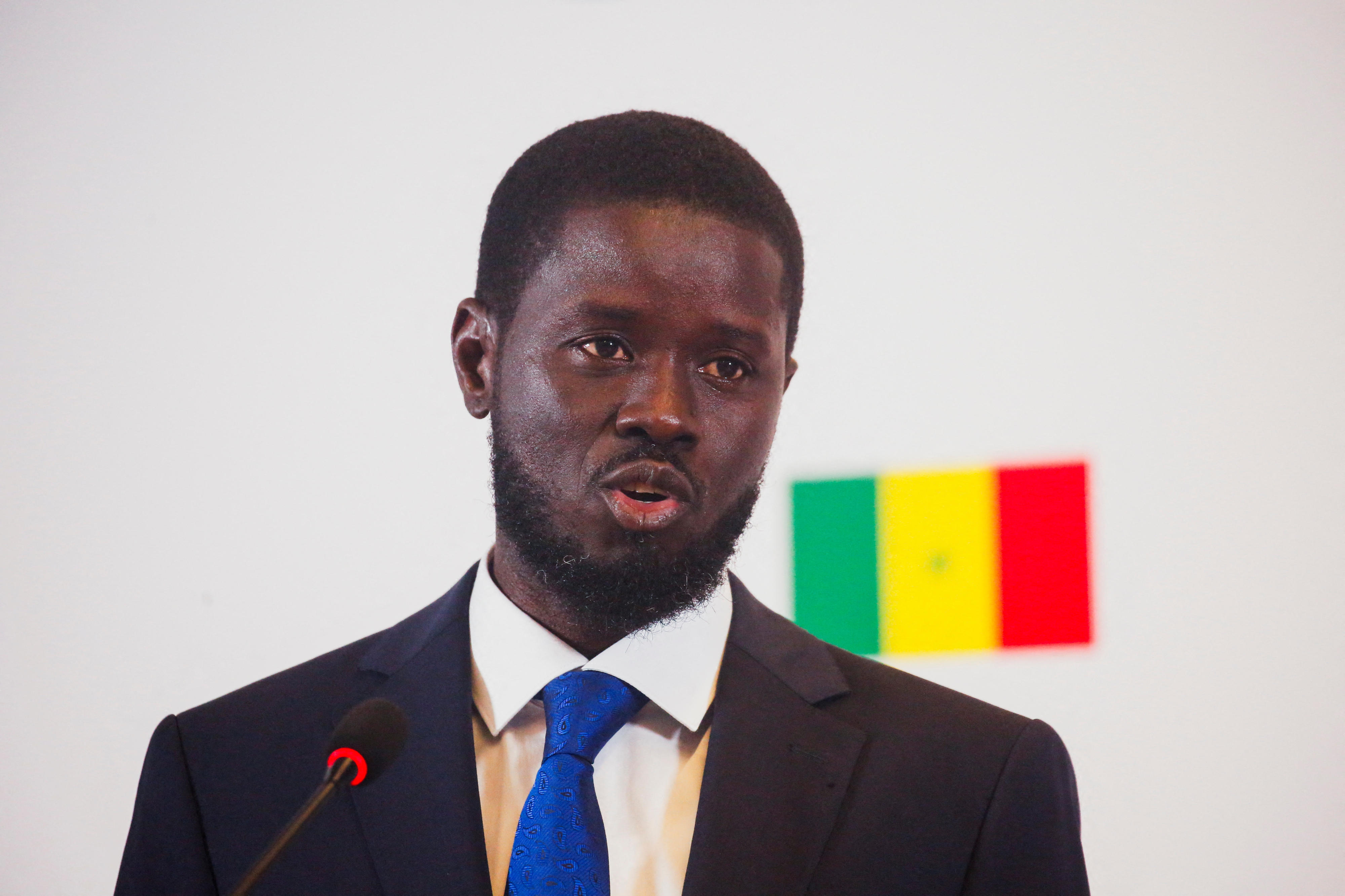Prime
Greed drives fisherman to drown colleague in lake

Left, Muhammed Kawooya fights with Ronald Buwembo over ownership of fishing grounds. ILLUSTRATIONS BY Alex KwizEra
What you need to know:
Every Ugandan has a right to fish in any water body in the country. Muhammed Kawooya didn’t think so. He believed he had sole territory”.
Early in the morning, Muhammed Kawooya, a fisherman at Kitinda, a village at the shores of Lake Victoria in Katabi Sub-county, Wakiso District, said he was a lucky man.
At around 5.30am, on November 4, 2011, Kawooya had not only chanced on a thief trying to steal his fishing gear but was able to pursue him and wrestle him.
“I caught him. The thief fought me as he tried to flee. He even bit my finger. But I persisted and wrestled him and left him in the water,” Kawooya told his fellow fisherman Medi Musoke, known to many as Rasta.
Rasta was happy about Kawooya’s success. Theft of fishing gears is a big problem on Lake Victoria. Catching a fishing gear thief alone is a rare occurrence.
“Is he the one I heard crying ‘Kawooya you are killing me?” Rasta asked him. “I was hearing the sound but I couldn’t see you.”
“Yah! Yah!” Kawooya hesitantly responded.
Kawooya told Rasta although he was proud to have stood in the way of the criminal, he did not want his heroic act publicised.
He offered Rasta one of the biggest catch to keep the secret. After he received the fish, Rasta bade him farewell and they parted.
In the evening in the same village, news started spreading around that a young fisherman was missing.
The fisherman’s mother, Rose Nakibwere, went telling people that her son, Ronald Buwembo, 22, left for fishing the previous day and was expected to return home the next day.
However, he had not yet come back home and his mobile phones were switched off, something he never did.
The fruitless search

Kawooya drowns Buwembo in the lake.
Buwembo’s colleagues embarked on a search for him. All those who had seen Buwembo said he was last spotted in his boat fishing.
The search only led the crew to Buwembo’s boat and his clothes. His colleagues began to worry. When a fisherman fails to return, he could be in trouble and if a search isn’t carried out in time, the worst may occur.
Their search yielded nothing. The team abandoned the search at nightfall. The missing fisherman never appeared.
Buwembo had left home a beautiful wife and two children waiting for him to return with lunch but they were at dinner time and the bread winner was nowhere to be seen.
The next day, the news of his missing spread. Fishermen gave conflicting stories of what could have happened to Buwembo.
Some claimed he could have drowned, while others said he could have gone with friends to the islands to pursue a better life. The family members feared for the worst.
Among the people who received the news of the missing resident was Rasta.
Rasta later told detectives he had heard someone crying for help a day before. He wasn’t certain about who it was since it was still too dark to see.
The only person he had seen sailing from that direction was Kawooya, who had also told him he had confronted a thief. Buwembo wasn’t known to be a thief in the community.
Letting the secret out

After killing Buwembo, Kawooya gives Medi Musoke, his big catch to keep him silent.
The secret was burning within him. He couldn’t hold it anymore.
He went to Nakibwere’s home and told his story.
“Maybe, the thief Kawooya confronted was Buwembo. Maybe not,” Rasta told Nakibwere.
Nakibwere didn’t wait for Rasta to finish his narration. Her mind recollected what had happened months before.
Her son used to work with Kawooya on the same boat until they disagreed over fishing grounds.
She said Kawooya had threatened her son more than four times in public about the same issue.
Her tale angered residents so much that they went hunting for Kawooya at his home in Ntinda village in the same sub-county. They got hold of him and questioned him about the whereabouts of Buwembo.
He denied having met Buwembo on the lake the previous day. Residents examined his fingers and one had a wound as Rasta had claimed.
To them, the wound was enough evidence. They beat him to extract a confession.
Kawooya continued to deny any involvement in the missing of Buwembo.
Before the angry mob finished him off, police officers, led by Edgar Nyabongo, the then division commander Entebbe, intervened and saved him.
At Entebbe Police Station, Corporal Francis Wambi interrogated him.
“He admitted to have had a fight with Buwembo and thrown him in water,” Cpl Wambi said according to police records.
Finding the body
Corporal Wambi put Kawooya in a boat to guide them to the spot where the fight took place. Kawooya cooperated. Marine officers were called in to search the area.
They neither found Buwembo’s body nor traces of his property.
Marine officers had to wait for another day when the body of Buwembo finally emerged on top. It was immediately retrieved and taken to the mortuary for a postmortem.
Top police doctor Moses Byaruhanga, was called in to examine the body. Dr Byaruhanga’s analysis showed that the deceased had died of asphyxia – a condition results from lack of oxygen or suffocatation after drowning.
Dr Byaruhanga’s report stated that the body had a swollen neck and a wound on the head, which indicated that the deceased struggled before he died.
Kawooya was now placed on murder charges. However, detectives had an uphill task to link Buwembo’s death to Kawooya.
They couldn’t link the wounds that were inflicted on the deceased to any particular person.
Secondly, no eyewitness had seen Kawooya fight with Buwembo and throw him in the lake.
Rasta was the only person who had heard a death declaration of someone he didn’t see. He was the only witness they could rely on.
The detectives had to piece up the evidence and loose confession by Kawooya to pin him on the murder.
Detectives recorded more statements from Buwembo’s mother, Rasta, and two police officers who participated in the investigation.
The Director of Public Prosecutions was convinced with the detective’s conclusion that Buwembo was killed by Kawooya and sanctioned the charges of murder.
Rubbishing the evidence
Later Kawooya appeared to a lower court that remanded him until his trial started in High Court, where he denied the charges. He insisted that proof the prosecution relied on that he told Rasta that his finger had been bitten by Buwembo during the fight was false. He said the wound on his finger was a result of piecing by a fish bone. And he had never shown that wound to Rasta.
Judge Wilson Masalu Musene wasn’t convinced.
“The question is if he did not show it to PW4 [Rasta], then how he (Musoke alias Rasta) could have known about that wound on his fingers. And this Court could read nothing but open lies in the eyes of the accused from the witness stand,” Judge Musene said.
Judge Musene was convinced that Kawooya killed Buwembo by drowning him.
“The accused, Muhamed Kawooya, now standing in the dock is the one who killed and drowned Ronald Buwembo on Lake Victoria at Kitinda village Katabi Sub-county,” he ruled.
Before the judge sentenced Kawooya, he sought for mitigation. Kawooya’s lawyer, Ms Gloria Basaza, asked for a lenient sentence since her client had two wives and eight children.
“The convict informed me that the deceased was a stubborn person and provoked the accused,” Ms Basaza told court.
On January 1, 2014, the judge passed the maximum sentence – death.
The sentence
A young man, Ronald Buwembo, who was at the prime of his life lawfully struggling to earn an honest living through fishing, was mercilessly murdered by the convict, Muhamed Kawooya on the pretext that he was interfering with his fishing area.
I want to state it categorically and clearly that all the people of Uganda, wherever they come from have the right to fish in lake Victoria and /or any other lake and rivers in Uganda.
There is no body of whatever status who has monopoly over the lake.
It was therefore sad, barbaric crude, cruel, satanic for the convict to have murdered the deceased in such a manner, only comparable to the horrific stories of what international pirates do on the high seas.
The young man helplessly pleaded with the convict not to kill him as reflected in the dying declaration brought out by Medi Musoke alias Rasta, (PW4).
It was indeed a very tragic death of Buwembo Ronald.
This court further finds that the murder of the deceased was maliciously planned and pre-meditated, following the earlier four warnings and threats to the deceased as brought out in the evidence of the helpless mother, (PW3).
Such a highly planned and maliciously executed murder of the deceased by the convict deserves a very harsh penalty.
A harsh penalty is necessary so that people can learn to value the sanctity of life.
And the courts of law in this country must live up to the expectations of the people and take bold steps to respond to negative challenges as those posed by terrorists and merciless murderers of law abiding citizens.
Such people like the convict now deserve no mercy. Counsel for the convict in mitigation has stated that the convict was provoked.
That is now too late as the defence of provocation was not raised at or during the trial. And much as the convict is said to be having a wife and eighty children, so as the deceased, who as I have already stated was aged 22 years and left equally a wife and two children.
The circumstances under which the offence was committed have been noted as emphasised by Mbaine for state. Thus, this court finds that its hands are tied, a strong message has to be sent to the people of Uganda.
Reckless killing and murder has to be eliminated if not avoided altogether.
In the circumstances, and in view of what I have outlined, I am constrained to give the maximum penalty.
You are therefore hereby sentenced to suffer death in the manner prescribed under the law.
judge WILSON MASALU MUSENE
Death on water bodies
47
Number of deaths in 2013.
28
Number of deaths in 2012.




